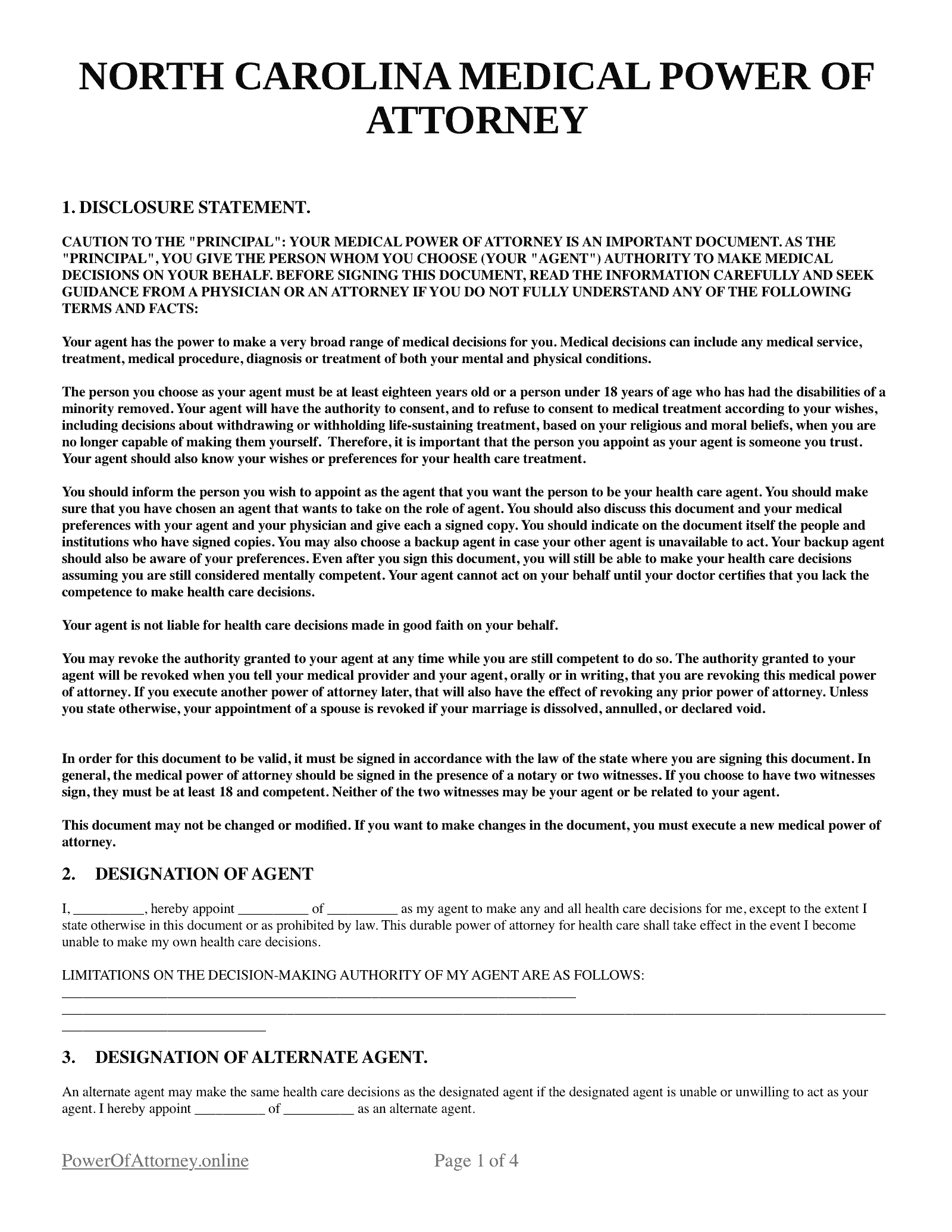Free North Carolina Medical Power of Attorney Forms
Medical care is a highly delicate matter and must be handled with extreme prudence. If someone anticipates one day being unable to manage their healthcare needs, then a medical power of attorney (POA) is necessary.
This is a legal document that authorizes one person (the agent) to make healthcare decisions for another (the principal). Here are the things you need to know about medical POA forms.

North Carolina Medical Power of Attorney Laws
The North Carolina Statutes Chapter 32A - Powers of Attorney outlines all laws relating to POAs. Article 3 dictates the specifics of creating a healthcare POA that will be valid in the state.
The provision states: “You have the right to name someone to make healthcare decisions for you when you cannot make or communicate those decisions. This form may be used to create a health care power of attorney, and meets the requirements of North Carolina law.
However, you are not required to use this form, and North Carolina law allows the use of other forms that meet certain requirements. If you prepare your own health care power of attorney, you should be very careful to make sure it is consistent with North Carolina law” (North Carolina General Statutes § 32A-25.1).
Signing Requirements in North Carolina
To complete the North Carolina healthcare POA, you must sign it in front of two qualified witnesses. A notary public must also approve the document.
“Do not sign this form until two witnesses and a notary public are present to watch you sign it. You then should give a copy to your healthcare agent and to any alternates you name” (North Carolina General Statutes § 32A-25.1).
While not a requirement, it is advised that the form be filed with the Advance Health Care Directive Registry, which is maintained by the North Carolina Secretary of State.
How to Write a Medical POA in North Carolina
Every state has different rules regarding the creation of a medical power of attorney, which acts as permission for the agent to make decisions on the principal’s behalf.
Here are the steps for creating one in North Carolina:
1. Find someone you can trust
A medical POA is critical because it is about a person’s health. You must find a person you can trust who can make the best decision for you.
The agent you choose must have your best interests in mind at all times and will make decisions according to the preferences you have outlined. Most people choose family members to act as their agents.
2. Talk to your chosen agent about their responsibilities
Explain to your agent the responsibility you will bestow upon them. They should understand what it entails, how difficult it is, and your wishes pertaining to your healthcare. This is the most critical step because if you become incapacitated, the agent should know all of your desires in terms of medical procedures and treatment.
According to the law: “This document gives the person you designate as your healthcare agent broad powers to make healthcare decisions for you when you cannot make the decision yourself or cannot communicate your decision to others.
You should discuss your wishes concerning life-prolonging measures, mental health treatment, and other health care decisions with your healthcare agent” (North Carolina General Statutes § 32A-25.1).
3. Download a printable North Carolina medical POA
Use an online North Carolina medical POA template.
Customize the form to reflect your specific needs. Make sure you include as many details as possible since the agent will be obliged to follow what is written on the document precisely.
4. Sign the form according to North Carolina laws
For the POA to be effective, you must sign it in the presence of two qualified witnesses. They must be of legal age, and neither can be your agent.
A North Carolina notary public must approve the form so the agent can exercise their authority.
5. You can now use the form
By law, healthcare personnel will ask for a copy of the medical POA from the agent before enacting decisions made on the principal’s behalf.
If the principal does not outline the terms of termination on the document, a general POA terminates upon revocation or when the principal becomes incapacitated. A durable POA terminates upon the principal’s revocation or death.